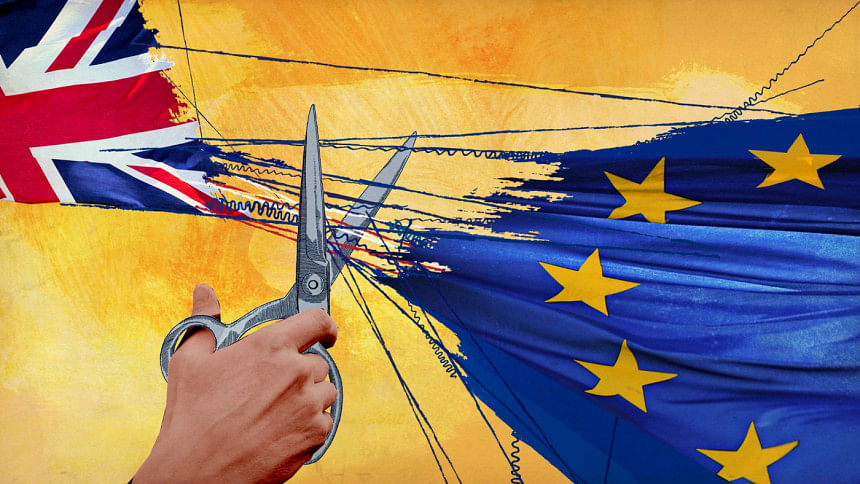How will we fare after Brexit?

With the UK Prime Minister triggering Article 50(2) of the Lisbon Treaty on March 29, UK has taken the first formal step leading to her departure from the EU. It is only logical that Bangladesh follows the upcoming Brexit negotiations with keen interest in view of the traditionally strong ties that the two countries have developed over the years. UK is a key development partner of Bangladesh, and the ties between the two countries cover a wide range of areas – trade and commerce, business and investment, aid and development support, people-to-people contact. Thus, it is in Bangladesh's interest to keep track of the upcoming Brexit negotiations in the next two years and remain engaged with the UK in view of the emerging scenario.
It may be noted here that, Bangladesh has already felt some of the early impacts of the UK referendum, held on June 23, 2016. The medium to long-term implications of the Brexit, both for the UK economy and the EU, are likely to be profound, and these will have important implications for their partner countries in the coming years.
With USD 3.81 billion worth of exports, UK is the third largest export destination of Bangladesh, after US and Germany, accounting for 11.1 percent of Bangladesh's global exports and 20.4 percent of her export to the EU in FY2015-16. UK is a major market for Bangladesh's apparels – textiles and RMG items account for about 93 percent of her total exports to the UK. Bangladesh is also gaining increasing foothold in a few other items – for example, over the last five years, average annual growth of footwear export to the UK has been significantly high – 27.5 percent. Exchange rate movement between the Great Britain Pound (GBP) and the Bangladesh Taka (BDT), following the June 2016 referendum, has already affected Bangladesh's export performance in the UK. Appreciation of BDT against GBP has undermined Bangladesh's export competitiveness particularly because Bangladesh experienced higher appreciation compared to some of her competitors in the UK market for apparels such as Vietnam and China. On the other hand, a depreciated GBP has made imports from UK to Bangladesh more competitive for the UK exporters. Bangladesh's exports to UK that are shipped onward to the EU market will also be impacted depending on the terms of UK's market access in the EU which will be negotiated in the course of the Brexit negotiations.
As long as the UK was part of the 28-member EU single market, Bangladesh was enjoying preferential treatment in the form of duty-free market access in the UK under the EU's everything but arms (EBA) initiative for the least developed countries (LDCs). Once UK leaves the EU single market, following conclusion of the Brexit negotiations, the market access scenario will likely change significantly. If UK takes the decision to offer market access to Bangladesh and other LDCs on similar terms as the EBA, following the Brexit, under the same terms and conditions, Bangladesh's exports will continue to enter under the prevailing regime. However, this has to be negotiated by Bangladesh, on a bilateral basis, or as part of the LDC group, with the UK.
Importance of the prevailing preferential market access in the UK is demonstrated by the fact that, import-weighted duties on Bangladesh's exports to the UK currently stand at about 11.7 percent. The duty-free entry thus offers significant competitive advantage to Bangladesh against duty-paying competitors such as Vietnam and India. A CPD study shows that, in absence of duty-free entry, total import duties to be paid for the top 20 items exported to the UK in FY2016, accounting for 81 percent of her total exports, would be about USD 375 million. Estimates carried out by the CPD also show that, in absence of duty-free treatment, Bangladesh's exports could fall by about 7.4 percent (worth about USD 280 million in FY2016 term). Indeed, Bangladesh is reckoned to be the hardest hit among all the countries receiving preference in the UK market. As the data indicates, following the UK referendum in June 2016, Bangladesh's export to the UK has fallen by 5.8 percent over the first seven months (July-January) of FY2017 compared to the corresponding period of FY2016 even though market access conditions have remained unchanged. Uncertainty about how Brexit will impact on the UK economy and the consequent subdued UK domestic demand, and also significant appreciation of the taka following the referendum are the possible reasons for this. In case of absence of the benefits accrued on account of the EBA, the negative effects will no doubt multiply. It is because of this that there is a need for a bilateral understanding about continued market access in the UK under preferential terms, following Brexit. In negotiating the trade deal with the UK, it will be important for Bangladesh to maintain the LDC-friendly terms and conditions which inform the EBA: principle of non-reciprocity, flexible rules of origin, friendly IPR regimes, SPS-TBT standards similar to the EBA.
UK is one of the major sources of remittance flows for Bangladesh; 5.8 percent of our total remittances (USD 14.9 billion) originated from the UK in FY2016. The significant appreciation of the taka against the pound has meant that recipients of remittances in Bangladesh have been receiving relatively lower amount in taka terms for the same amount of remitted money (in GBP terms) from the UK. Estimates show that remittance from UK during July-February period of FY2017 was 15 percent lower in GBP terms, and 30 percent lower in taka terms, over the matched period of FY2016. Bangladesh will need to take appropriate steps so that remittance flows through formal channels from the UK, and is not discouraged due to currency fluctuations by way of diversion to informal channels. At the same time, Bangladesh will need to carefully examine the new migration policy to be negotiated, and subsequently pursued by the UK, in view of Brexit. As is known, migration was a key issue during the debate in the run up to the referendum. In all possibility, inflow of migrant workers from the EU to the UK will see significant curtailment; this could open up job opportunities for the Commonwealth member countries such as Bangladesh. Relatively competitively waged Bangladeshi workers could gain from the new UK regulations.
UK is one of the few G-20 countries which have fulfilled their pledge of allocating 0.7 percent equivalent of respective GNI towards overseas development assistance (ODA). With USD 230 million received as support in FY2016, Bangladesh was UK's 9th largest ODA recipient. About 14.3 percent of Bangladesh's total ODA comes from the UK. However, in taka terms the value of the ODA will suffer significant erosion in view of GBP depreciation vis-à-vis BDT. UK's exit will also have adverse impact on EU's pooled funds, such as the European Investment Bank (EIB), where UK is a major contributor. Low income countries receive assistance on favourable terms from these funds. Continued support by the UK towards areas which are currently supported by EU institutions should also be a matter of interest to developing countries such as Bangladesh.
UK is a major investor in Bangladesh. Cumulative UK investment stock till September 2016 was about USD 1560 million. These were mainly in the banking, textile and food industry sectors. While local procurement (in Bangladesh) for UK companies could become costlier (in view of GBP depreciation), repatriation of profits is likely to bring additional gains to the UK companies (in view of taka appreciation). It will be in Bangladesh's interest to encourage UK companies to continue to take interest in investing in Bangladesh. These companies could also play an important role in ensuring continued preferential market access in the UK since a significant part of their products are destined to this market.
Commonwealth as an organisation could gain increasing importance in UK's policy once she leaves the EU. Preferential treatment arrangement of some type, among the 54 Commonwealth member countries, has also been mooted. UK will also need to open discussion with the WTO members to renegotiate its trade relationship with these countries. It will be in Bangladesh's interest to keep track of these negotiations.
Brexit negotiations are likely to continue till March 2019 (and even beyond, subject to concurrence of all the parties). It is too early to speculate how the negotiations will evolve, although UK has given some early signals in the White Paper that it has circulated. UK is hoping to have a trade deal that will be significant in terms of 'scope and ambition' and she is keen to maintain 'deep and special' relations with the EU. However, it is still uncertain whether it is going to be 'Hard Brexit' or 'Soft Brexit'. In view of the evolving scenario, Bangladesh may set up a Task Force to study the possible impacts of Brexit on the Bangladesh economy, and to design appropriate strategies in this connection. The mandate of this Task Force may be as follows: (a) study the terms of Brexit, and examine their likely implications for the Bangladesh economy (market access, RoO, standards, IPR regime, migration remittance, investment, aid), (b) examine the developments in the UK economy, including demand situation and currency movements, and financial markets dynamics and their relevance for Bangladesh (BDT exchange rate remittance flow, dynamics of UK domestic demand), (c) study UK's negotiations in the various multilateral fora such as the WTO (adoption of schedule of concessions in the WTO, negotiations with members, special and differential treatment commitments and obligations) and regional trading arrangements (with UK participation, their terms and conditions, likely preference erosion for Bangladesh), and (d) provide strategic guidance to the GoB to build Bangladesh-UK bilateral relationship for the post-Brexit era (trade and market access, investment, aid, to name only a few) as also to contribute to designing Bangladesh's stance in relation to the UK as a leading member of the group of LDCs. Bangladesh has a strong bilateral, multi-dimensional relationship with the UK which has traditionally been a very special one. Maintaining this relationship, and its further strengthening, under the newly emerging post-Brexit scenario, ought to receive high priority from Bangladesh's policymakers.
The writer is Distinguished Fellow at Centre for Policy Dialogue (CPD).

 For all latest news, follow The Daily Star's Google News channel.
For all latest news, follow The Daily Star's Google News channel. 



Comments